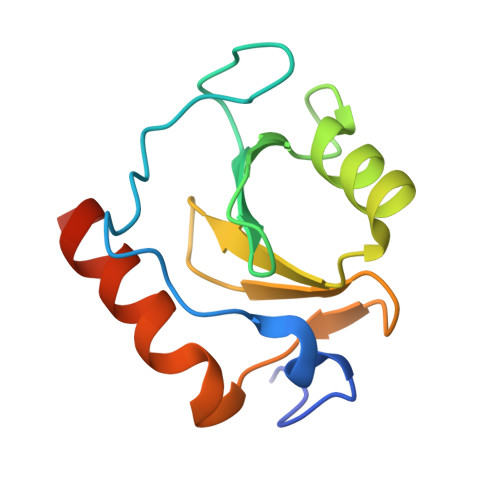Identification and Structure-Activity Relationship of HDAC6 Zinc-Finger Ubiquitin Binding Domain Inhibitors.
Ferreira de Freitas, R., Harding, R.J., Franzoni, I., Ravichandran, M., Mann, M.K., Ouyang, H., Lautens, M., Santhakumar, V., Arrowsmith, C.H., Schapira, M.(2018) J Med Chem 61: 4517-4527
- PubMed: 29741882
- DOI: https://doi.org/10.1021/acs.jmedchem.8b00258
- Primary Citation of Related Structures:
6CE6, 6CE8, 6CEA, 6CEC, 6CED, 6CEE, 6CEF - PubMed Abstract:
HDAC6 plays a central role in the recruitment of protein aggregates for lysosomal degradation and is a promising target for combination therapy with proteasome inhibitors in multiple myeloma. Pharmacologically displacing ubiquitin from the zinc-finger ubiquitin-binding domain (ZnF-UBD) of HDAC6 is an underexplored alternative to catalytic inhibition. Here, we present the discovery of an HDAC6 ZnF-UBD-focused chemical series and its progression from virtual screening hits to low micromolar inhibitors. A carboxylate mimicking the C-terminal extremity of ubiquitin, and an extended aromatic system stacking with W1182 and R1155, are necessary for activity. One of the compounds induced a conformational remodeling of the binding site where the primary binding pocket opens up onto a ligand-able secondary pocket that may be exploited to increase potency. The preliminary structure-activity relationship accompanied by nine crystal structures should enable further optimization into a chemical probe to investigate the merit of targeting the ZnF-UBD of HDAC6 in multiple myeloma and other diseases.
Organizational Affiliation:
Structural Genomics Consortium , University of Toronto , MaRS South Tower, Suite 700, 101 College Street , Toronto , Ontario M5G 1L7 , Canada.

















